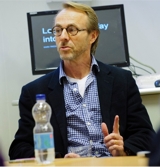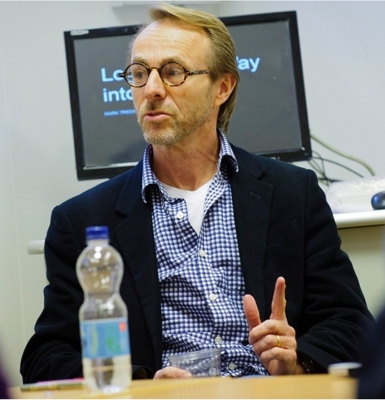| site search by freefind |

|
Skype Session 9: |
Translating the unsayable world –
a poetry workshop with Mark Tredinnick

In A Midsummer Night’s Dream, Shakespeare has Theseus say that a poet “gives to airy nothing a local habitation and a form.” It translates what is unsayable.
A poem is a sculpture of voice, an architecture of utterance. It’s what a poet’s heart says to her mind, and her voice finds a body for. Each good poem is shapely god; keeping its own secrets, it tells us our own. “Why write poems,” writes Gregory Orr, “If not because grief or joy/ Has seized you?” With Rumi and the mystics, Orr would add that each poem is not just a complex, oblique, emotional cry to the Beloved—a yearning for the rest of who, and where, you thought you were. Each poem is, somehow, the Beloved—returned and embodied, in all his or her manifold and maddening contradiction. A poem “should always replace a yearning,” writes Don Paterson. “A poem must take the shape of a woman, a man, a god, or a ghost, or else it is probably no poem at all.”
Form and voice, then, are a big deal in a poem. By forcing hard linguistic choices on a poet, line after line, poetic form frees language (forces it, perhaps) to do the other work we need language to do (beyond its functional duties in the market and the kitchen and the story): the work of recasting life’s exquisite spell, transfiguring pain, naming injustice, unseating banality, throwing soft bombs, making semantic jazz, hymning, translating what is normally unsayable in one’s life and in the world beyond one’s self…that kind of thing.
By asking more of language than we normally ask, by letting it invoke as well as evoke, sing as well as say, be as well as mean, poetry divines the world within the world we know and gives it form: an architecture of utterance. It is specially gifted, Mark Strand has said, at catching the beyondness and the innerness of things—the other world within the world of everyday light and life. Imagining a moment of epiphany, but also contemplating poetry’s work, Seamus Heaney writes in one of the “Squarings” in Seeing Things, “that day I’ll be in step with what escaped me.” Poetry puts us back in step with what escapes us—with lives, as Strand puts it, we are too busy getting on with to live all the way down and back again, let alone articulate; with that which is charged or perhaps divine or mysterious in things; with our Divine selves, as the Hindus put it, our dreaming selves. And poetry forgives us the silliness of imagining anything might be out there, or in here: that there is another world within the one that meets one’s everyday eyes.
Talking through some matters of form, prosody and poetic practice; walking through the drafts of one or two of his own poems and speaking of his own creative practice; reading closely a poem or two by great twentieth-century poets, Mark Tredinnick—one of Australia’s leading poets and the winner of the Montreal (2011), Cardiff (2012), Newcastle (2007, 2011), Blake (2008) and other poetry prizes—explores the nature and manufacture of poetry and the notion that it translates the unsayable world.
A practical and inspiring workshop on the disciplines of beauty entailed in fashioning a poem. Among many things Mark covers in this introduction to the nature and uses and practice of poetry, Mark will explore:
- Poetic forms, conventions and architectures
- The nature of a line and the uses of enjambment
- Speech music, rhythm and rhyme
- Tone, voice, attitude, person, point of view
- The necessary opacity and difficulty of a poem—how to keep your secrets, but tell your reader hers; how to tell all the truth, but tell it slant
- Showing and telling and indirection
- Devices for getting out of your own way and letting the poem find you and speak itself in your voice
- Poetic modes and sensibilities: lyric, confessional, declamatory, ironical, casual, formal, conversational, operatic, oracular, academical, comical.
DATE: Saturday, June 21.
TIME: 11:00 am to 12:00 noon.
VENUE: Armidale Dumaresq Council War Memorial Library, 122 Faulkner St, Armidale
COST: $15 members, $20 non-members
BOOKINGS: Bookings are essential as places are limited. Phone (02) 6772 7210 or send an email message to admin@newc.org.au. Alternatively call in at the office during opening hours.
Please note: Bookings must be made with the New England Writers Centre (not the Armidale Library) and must be paid two weeks in advance to hold your booking.

Mark Tredinnick is a celebrated poet, nature writer and essayist. He lives and writes along the Wingecarribee River, southwest of Sydney, and he travels widely as a poet and teacher.
The winner in 2011 of the Montreal Poetry Prize and in 2012 of the Cardiff Poetry Prize, Mark is the author most recently of Bluewren Cantos (Pitt Street Poetry, 2013) and the editor of Australian Love Poems 2013.
His other books include Fire Diary, The Blue Plateau, Australia’s Wild Weather, and The Little Red Writing Book.
Mark’s other honours include two Premier’s literary awards, the Blake and the Newcastle Poetry Prizes, the Calibre Essay Prize, and a shortlisting for the Prime Minister’s Literary Prize.
His third poetry collection, Body Copy, will be out in 2014 from Pitt Street Poetry; he is at work on a fourth collection and a memoir, Reading Slowly at the End of Time.
One of our great poets of place—not just of geographic place, but of the spiritual and moral landscapes as well … a Whitmanesque Emily Dickinson.
—Judy Beveridge
In virtuosic syntax and with breathtaking syntax, he makes the landscape … flame and sing. And then there is the sheer specific beauty of what’s displayed and contemplated in his work.
—Sinéad Morrissey
Tredinnick has a tenderly erotic way of taking things. Every poem is a love poem.
—Philip Gross
This is a bold, big-thinking poetry, in which ancient themes (especially the theme of our human relationship with landscape) are recast and rekindled.
—Andrew Motion
Inquiries
All workshops must be booked and paid for in advance. For information about the program or to book for events:
Phone (02) 6772 7210 or send an email message to admin@newc.org.au
NEWC membership entitles you to do the workshop at the reduced member rate.
You can become a member when you book a workshop. Our annual membership fees are:
| Adults: | $30.00 including GST |
| Students (tertiary): | $20.00 including GST |
| Students (under 18): | $15.00 including GST |
Venue
Unless otherwise stated, all events will be held at the New England Writers' Centre (NEWC), in the Neighbourhood Centre, 129 Rusden Street, Armidale (between the Council Building and the Town Hall).
Access
During opening hours and workshops, access is through the Cinders Lane car park (first door on left, in the corridor).
Parking
There is a one-hour parking restriction in the Cinders Lane carpark.
The New England Writers' Centre is assisted by the NSW Government through Arts NSW.